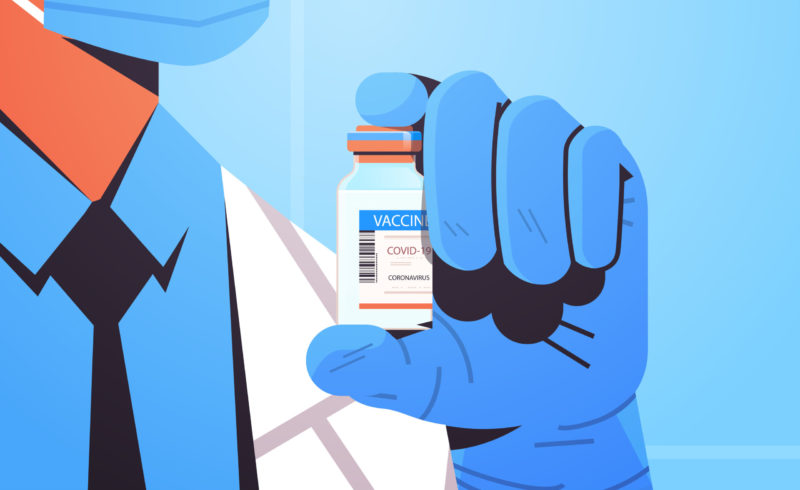Learn more about our FREE COVID-19 Patient Support Program for chronic illness patients and their loved ones.
If you have rheumatoid arthritis (RA), inflammatory bowel disease (IBD), psoriasis, or any other autoimmune condition that causes inflammation, you likely take medication designed to reduce your body’s overreactive response. While that’s great as far as keeping your disease in check, it might lower your ability to fight infections, including SARS-CoV-2, the virus that causes COVID-19.
Your treatment might also reduce your body’s ability to generate as strong an immune response when given a vaccine as someone who does not take these medications — at least in theory. But a new (albeit small) study yields some preliminary good news.
The study, which was published in the journal Annals of the Rheumatic Diseases, is the first to specifically examine the impact of mRNA vaccines (such as those from Pfizer and Moderna) on people who take immunosuppressive drugs to manage a chronic inflammatory disease. Researchers enlisted 26 people with chronic inflammatory disease (deemed “patients”), as well as 42 individuals without chronic inflammatory disease (deemed “controls”).
The patient group was 64 percent women with an average age of 50.5 years. Most were health care workers and had not been previously infected with COVID-19.
Researchers measured the presence of SARS-CoV-2 antibodies in everyone’s bloodstream prior to vaccination, the day they received the second shot of the two-dose regimen, and a week after participants received the second shot. Researchers also monitored patients’ disease activity to see if they experienced any flares tied to the vaccine. Disease activity was assessed through a composite measure called the disease activity score 28 (DAS28), which includes looking for pain and swelling in 28 joints as well a patient’s and doctor’s assessments of a patient’s health. Any side effects from the vaccine were self-reported by the participants.
Vaccine Effectiveness
Although the controls produced a higher number of antibodies than the patients, nearly everyone in the study produced a sufficient number when levels were measured after the second dose of the vaccine. There were no “non-responders” — or people who did not produce any antibodies.
Vaccine Side Effects and Flares
Also reassuring: People inflammatory diseases did not report experiencing flares after being vaccinated.
Compared to controls, those with a chronic inflammatory disease were slightly more likely to report a mild side vaccine effect such as fatigue, headache, or muscle pain. They were, however, less likely to develop a fever than those without inflammatory diseases.
People with inflammatory disease were using a variety of treatments, including different traditional disease-modifying antirheumatic drugs (DMARDs), biologics, and steroids. The study wasn’t big enough to draw any conclusions about the relative impact of these various types of medications on antibody levels. Bigger studies will be needed to assess whether certain immunosuppressive medications decrease the immune response to the vaccine more than others.
The authors acknowledged that this was a small study, and more research is needed, but their results should offer some comfort to those with chronic inflammatory diseases who want to protect themselves against COVID-19.
“Our data demonstrate for the first time that patients with a selection of immunosuppressive therapies for [chronic inflammatory disease] are able to mount an effective immune response after SARS-CoV-2 mRNA vaccination without significant side effects or flares,” the researchers wrote. “Thus, we strongly recommend continued vaccination of immunosuppressed patients.”
Get Free Coronavirus Support for Chronic Illness Patients
Join the Global Healthy Living Foundation’s free COVID-19 Support Program for chronic illness patients and their families. We will be providing updated information, community support, and other resources tailored specifically to your health and safety. Join now.
Geisen UM, et al. Immunogenicity and safety of anti-SARS-CoV-2 mRNA vaccines in patients with chronic inflammatory conditions and immunosuppressive therapy in a monocentric cohort. Annals of the Rheumatic Diseases. March 24, 2021. doi: https://doi.org/10.1136/annrheumdis-2021-220272.






